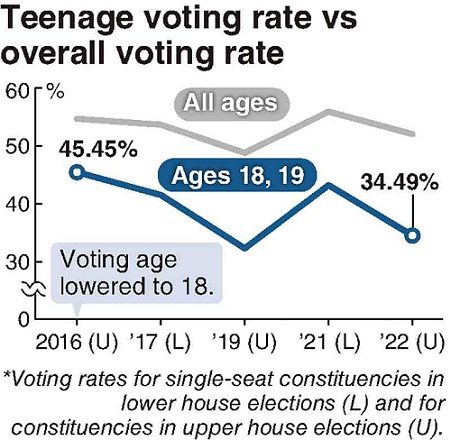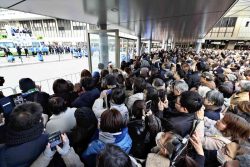
People cast votes at a polling station in Tokyo on July 10.
20:00 JST, July 26, 2022
The voter participation rate among 18- and 19-year-olds in the House of Councillors election on July 10 stood at 34.49%, up 2.21 percentage points from the previous upper house poll, according to a sampling survey by the Internal Affairs and Communications Ministry.
Despite the slight rise, the figure was still 17.56 points lower than the overall voter turnout rate of 52.05%. That marks the largest gap between the two figures since the 2016 upper house election, which was the first to be held after the voting age was lowered to 18.
According to the ministry, in the latest upper house election, the voting rate of 18-year-olds was 38.67%, up 3.05 points from the previous poll, while that of 19-year-olds increased 1.48 points to 30.31%.
By gender, 18-year-old females had the highest voting rate at 41.22%, followed by 18-year-old males at 36.25%, 19-year-old females at 31.83% and 19-year-old males at 28.91%.
In the five national elections since the voting age was lowered, voting rates for 18- and 19-year-olds were significantly lower than overall rates each time, suggesting that Japan’s youngest voting-age citizens still have low levels of interest in elections.
The voting rate among 18- and 19-year-olds in the 2016 upper house election stood at 45.45%, the highest ever for the age group. However, the figure declined to 41.51% in the 2017 House of Representatives election and hit a low of 32.28% in the 2019 upper house election.
An education ministry survey announced in 2020 found that more than 90% of high schools nationwide had implemented education to enhance the awareness of students as voters, but most of them merely describe the voting system.
Overseas voting barely over 20%
Among Japanese living overseas, 22.04% voted in the proportional representation section of the latest upper house election, up from 21.07% in the previous poll, while 21.91% voted in the constituencies, up from 20.86%.
This time, overseas balloting was conducted at 234 diplomatic missions abroad. At eight other locations, including ones in Ukraine and Afghanistan, balloting was not conducted due to war or other security-related reasons.
Japanese citizens living overseas must register to vote. Since April this year, it has been possible to do so through video communication as well as by visiting a diplomatic mission in person.
Casting a vote abroad must be done either by visiting a diplomatic mission in person or by mailing a ballot to Japan.
As diplomatic missions abroad are located in urban areas, some say it is inconvenient for those living in rural areas, leading to a lower voting rate.

An artist illustration : Teenage voting rate vs overall voting rate
Top Articles in Politics
-

Japan PM Takaichi’s Cabinet Resigns en Masse
-

Sanae Takaichi Elected 105th Prime Minister of Japan; Keeps All Cabinet Appointees from Previous Term
-

Japan’s Govt to Submit Road Map for Growth Strategy in March, PM Takaichi to Announce in Upcoming Policy Speech
-

LDP Wins Historic Landslide Victory
-

LDP Wins Landslide Victory, Secures Single-party Majority; Ruling Coalition with JIP Poised to Secure Over 300 seats (UPDATE 1)
JN ACCESS RANKING
-

Japan PM Takaichi’s Cabinet Resigns en Masse
-

Japan Institute to Use Domestic Commercial Optical Lattice Clock to Set Japan Standard Time
-

Israeli Ambassador to Japan Speaks about Japan’s Role in the Reconstruction of Gaza
-

Man Infected with Measles Reportedly Dined at Restaurant in Tokyo Station
-

Man Infected with Measles May Have Come in Contact with Many People in Tokyo, Went to Store, Restaurant Around When Symptoms Emerged





















